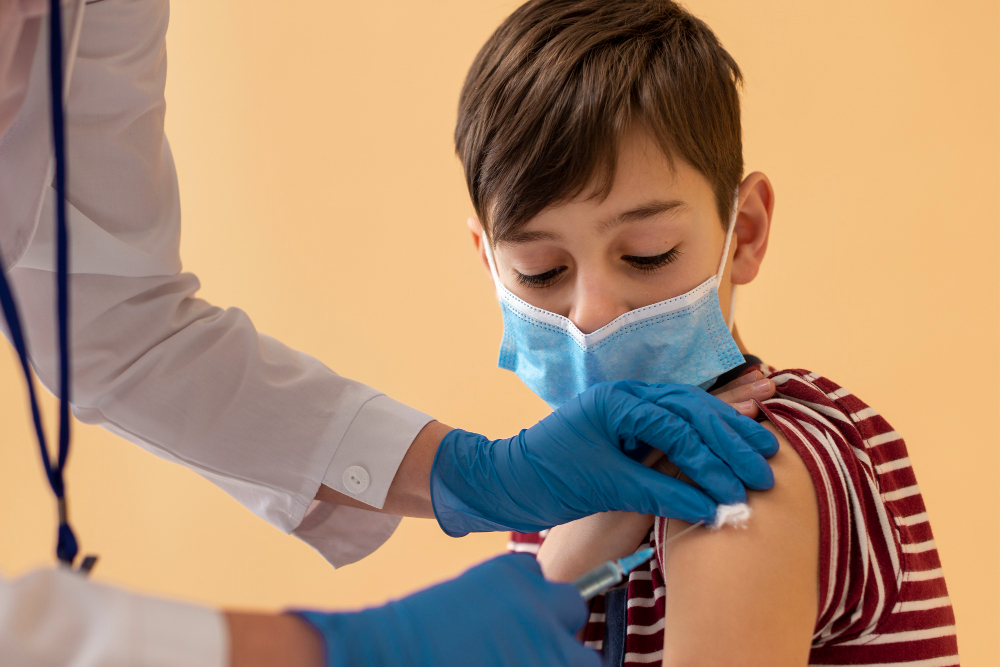What is Vaccination in Children?
Vaccination in children means giving vaccines to protect them from serious diseases. Vaccines help the body build defenses against germs. As a result, children are less likely to get sick from infections like measles, polio, or whooping cough. In the United States, doctors follow a set childhood vaccination schedule to keep kids healthy. Vaccines are given as shots, drops, or sprays, depending on the type. Most vaccines are given in the first few years of life. However, some are needed later as boosters. Vaccination is a safe and proven way to prevent illness in children.
Why Vaccination is Important for Children
Vaccines protect children from diseases that can cause serious harm. For example, some illnesses can lead to hospital stays or long-term problems. Vaccination in children also helps stop the spread of diseases in the community. When most kids are vaccinated, it is harder for germs to spread. This protects babies, older adults, and people with weak immune systems. In addition, vaccines have helped reduce or even wipe out some diseases. For instance, smallpox no longer exists because of vaccination. Therefore, keeping up with immunization in children is very important for their health and for everyone around them.
Recommended Vaccination Schedule for Children
The childhood vaccination schedule tells parents when to get each vaccine. The Centers for Disease Control and Prevention (CDC) and the World Health Organization (WHO) provide clear guidelines. Following the schedule gives the best protection at the right time. Here are some common vaccines and when they are usually given:
Some vaccines may be given as combination shots. Your doctor will explain which vaccines your child needs and when. Always check with your pediatrician for the latest schedule in your area.
Common Myths and Facts about Childhood Vaccines
Many parents have questions about vaccine safety for kids. However, some myths can cause worry. Let’s look at the facts:
Therefore, it is important to rely on trusted sources like the CDC or WHO for vaccine information.
Safety and Side Effects of Vaccines
Vaccines are very safe for children. Before approval, they go through many tests. After approval, experts keep checking for side effects. Most side effects of vaccines in children are mild and go away quickly. For example, your child may have:
Serious side effects are rare. However, if your child has a high fever or trouble breathing after a vaccine, call your doctor right away. Remember, the risk of disease is much higher than the risk of side effects from vaccines.
How to Prepare Your Child for Vaccination
Getting a shot can make children nervous. But there are ways to help them feel better. First, talk to your child about what will happen. Use simple words and stay calm. You can also:
After the vaccine, watch for mild side effects. Give extra hugs and comfort if needed. If you have questions, ask your doctor before the visit.
Tips for Keeping Vaccination Records
It is important to keep track of your child’s vaccines. Good records help you know which shots are done and which are due. Here are some tips:
Keeping good records helps avoid missed or extra shots. It also makes travel and school entry easier.
Prevention and Community Benefits
“Vaccination in children does more than protect one child—it helps protect the whole community. When many children are vaccinated, diseases have less chance to spread, creating herd immunity. This protects those who cannot get vaccines, like newborns or individuals with certain illnesses. Widespread vaccination can stop outbreaks and save lives, and over time, some diseases may even disappear completely. By vaccinating your child, you help protect your family and your community.
For the best advice on vaccination in children, consult Dr. Sindhu Sumanth Reddy, a pediatrician. She can guide you on the right schedule and answer any questions about vaccine safety for kids.”

